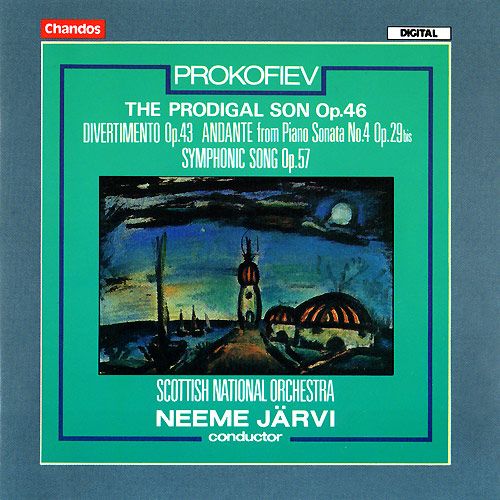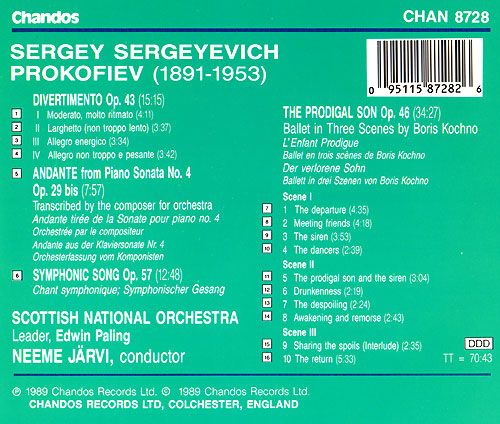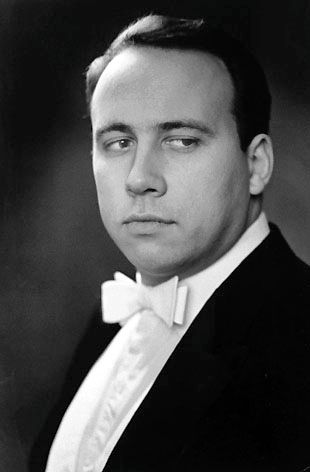wimpel69
11-25-2014, 12:44 PM
EAC-FLAC link below. This is my own rip. Complete artwork,
LOG and CUE files included. Do not share. Buy the original!
Please leave a "Like" or "Thank you" if you enjoyed this!
The Prodigal Son was the last new ballet staged by impresario Sergei Diaghilev's Ballets Russes.
It was Sergei Prokofiev's third for Diaghilev (discounting the unproduced Ala and Lolli, from 1914-1915), the
previous two being Chout (1915-1920) and Le Pas d'acier (1925), both controversial and
successful. The premiere of The Prodigal Son on May 21, 1929, was also a success, but stirred less
controversy.
Prokofiev drew on a scenario by Boris Kochno, and George Balanchine provided the choreography.
There are ten numbers, four in each of the first two scenes and two in the final one. The famous Biblical
parable is the source of the story, of course, but Kochno made changes to it, most notably adding the
character of the Siren and replacing the older brother with two deceitful friends.
The first number, "The Departure," is vigorous and colorful, the opening theme a gruff, muscular
creation that is brilliantly contrasted by a mellow and relaxed clarinet melody that alternates with it.
"Meeting Friends" comes next and features boisterous, manic music at the outset, that is immediately
followed by its emotional opposite, a subtle, subdued theme of utter suavity that, along with other
themes in the ballet including the opening one, would find its way into Prokofiev's Fourth Symphony,
Op. 47 (1930).
"The Siren" (No. 3) provides the main theme for the scherzo in that symphony and here depicts
the enchantress with exotic, lively music. "The Dancers" (No. 4) is vigorous, again featuring gritty
string writing, with a theme appearing midway through that would later serve as the main theme to
the Fourth Symphony's first movement. "The Prodigal Son and the Siren" (No. 5) is subdued
and ethereal, and features the suave theme from "Meeting Friends," while "Drunkenness" (No. 6)
uses that earlier number's boisterous theme.
"The Despoiling" (No. 7) contains one of Prokofiev's most subtle dramatic creations: notes slither up
and down sneakily via sinister clarinets and wily flutes, brilliantly depicting the prodigal son's
swindling by his friends. The ensuing "Awakening and Remorse" is subdued and reflective, while
"Sharing the Spoils" (No. 9) is colorful and recalls earlier themes. The closing number, "The Return,"
without doubt contains the most memorable melody in the work, the serene, glowing theme
Prokofiev reused in the second movement of the Fourth Symphony. It foreshadows the Romanticism
of Romeo and Juliet and on its own divulges Prokofiev's melodic lushness, a trait somewhat missing
in his French years.

Music Composed by
Sergei Prokofiev
Played by the
Royal Scottish National Orchestra
Conducted by
Neeme J�rvi

"The Divertimento is a rarity which has not been available in the UK since Hans Swoboda's now deleted
mono LP of the mid 1950s, though the American Schwann catalogue lists a Vienna Radio version on
Grenadilia, while�and I brace myself for a shoal of letters�I know of no earlier recording of the orchestral
transcription of the Andante from the Piano Sonata No. 4, Op. 29bis or for that matter, of the Symphonic
Song, Op. 57. Best known by far is the ballet, The prodigal son, on whose riches Prokofiev drew when
composing his Fourth Symphony.
I could never understand the neglect of the Divertimento (or Divertissement) of 1929, which is an
attractive piece�the second group of the first movement is Prokofiev at his most beguiling. Not only
has it been absent from the catalogues in this country for the best part of three decades, it rarely
appears in broadcast programmes. The finale was originally intended for but not used in The prodigal
son and two of its movements come from the ballet Trapeze (1925), the other music for that work
being used in the Quintet, Op. 39. It is a charming piece and I am delighted to see it recorded at last.
Prokofiev made the orchestral transcription of the slow movement of the Fourth Sonata in the 1930s,
at much the same time as the Symphonic Song for large orchestra. Both works are characteristic in
that their scoring is particularly rich in dark, bass sonorities and the very thickness of the latter may
well have contributed to its failure when it was presented in Moscow in 1934. Harlow Robinson
recounts in his absorbing study of the composer (Robert Hale: 1987) how Miaskovsky, on seeing the
score, had warned Prokofiev that it was ''not entirely right for us � it lacks what we would call
monumentality�a familiar simplicity and breadth of contour''. It certainly does not have the simplicity
Prokofiev was to assume after his return to the USSR, nor is it perhaps first-class Prokofiev. But
Prokofiev at second best is still better than many of his contemporaries at very best, and I for one
am delighted to have the Symphonic Song on record.
There is no alternative version of The prodigal son listed in the Gramophone Compact Disc Catalogue,
nor is there an alternative on LP now that the Rozhdestvensky account (EMI Melodiya) is out of
circulation. It is an exuberant and inventive score and though some of it found its way into the Fourth
Symphony (1930), there is a great deal that didn't. Neeme Jarvi conducts this repertoire as to
the manner born and gives totally idiomatic accounts of all four pieces. The Scottish National
Orchestra play with enthusiasm and the recording is state-of-the-art with splendid presence,
and Prokofiev's occasionally over-scored textures emerge in excellent detail. Readers who enjoyed
the richly inventive Chout and Le pas d'acier ((CD) CHAN8729, 9/89) as much as I did, will find
great delight here. I am very pleased to have performances and recordings that do such justice
to these scores. Recommended with enthusiasm.'"
Robert Layton, Gramophone

Download Link - https://mega.co.nz/#!SFh3lTwK!J1O0sB-DHLljWLytDKgV0hz3ZAE5kcxwBrvvaoRc0Fk
Source: Chandos Records CD, 1989 (my rip!)
Format: FLAC(RAR), DDD Stereo, Level: -5
File Size: 322 MB (incl. artwork, booklet, log & cue)
Enjoy! Don't share! Buy the origina! Please leave a "Like" or "Thank you" if you enjoyed this! :)
LOG and CUE files included. Do not share. Buy the original!
Please leave a "Like" or "Thank you" if you enjoyed this!
The Prodigal Son was the last new ballet staged by impresario Sergei Diaghilev's Ballets Russes.
It was Sergei Prokofiev's third for Diaghilev (discounting the unproduced Ala and Lolli, from 1914-1915), the
previous two being Chout (1915-1920) and Le Pas d'acier (1925), both controversial and
successful. The premiere of The Prodigal Son on May 21, 1929, was also a success, but stirred less
controversy.
Prokofiev drew on a scenario by Boris Kochno, and George Balanchine provided the choreography.
There are ten numbers, four in each of the first two scenes and two in the final one. The famous Biblical
parable is the source of the story, of course, but Kochno made changes to it, most notably adding the
character of the Siren and replacing the older brother with two deceitful friends.
The first number, "The Departure," is vigorous and colorful, the opening theme a gruff, muscular
creation that is brilliantly contrasted by a mellow and relaxed clarinet melody that alternates with it.
"Meeting Friends" comes next and features boisterous, manic music at the outset, that is immediately
followed by its emotional opposite, a subtle, subdued theme of utter suavity that, along with other
themes in the ballet including the opening one, would find its way into Prokofiev's Fourth Symphony,
Op. 47 (1930).
"The Siren" (No. 3) provides the main theme for the scherzo in that symphony and here depicts
the enchantress with exotic, lively music. "The Dancers" (No. 4) is vigorous, again featuring gritty
string writing, with a theme appearing midway through that would later serve as the main theme to
the Fourth Symphony's first movement. "The Prodigal Son and the Siren" (No. 5) is subdued
and ethereal, and features the suave theme from "Meeting Friends," while "Drunkenness" (No. 6)
uses that earlier number's boisterous theme.
"The Despoiling" (No. 7) contains one of Prokofiev's most subtle dramatic creations: notes slither up
and down sneakily via sinister clarinets and wily flutes, brilliantly depicting the prodigal son's
swindling by his friends. The ensuing "Awakening and Remorse" is subdued and reflective, while
"Sharing the Spoils" (No. 9) is colorful and recalls earlier themes. The closing number, "The Return,"
without doubt contains the most memorable melody in the work, the serene, glowing theme
Prokofiev reused in the second movement of the Fourth Symphony. It foreshadows the Romanticism
of Romeo and Juliet and on its own divulges Prokofiev's melodic lushness, a trait somewhat missing
in his French years.

Music Composed by
Sergei Prokofiev
Played by the
Royal Scottish National Orchestra
Conducted by
Neeme J�rvi

"The Divertimento is a rarity which has not been available in the UK since Hans Swoboda's now deleted
mono LP of the mid 1950s, though the American Schwann catalogue lists a Vienna Radio version on
Grenadilia, while�and I brace myself for a shoal of letters�I know of no earlier recording of the orchestral
transcription of the Andante from the Piano Sonata No. 4, Op. 29bis or for that matter, of the Symphonic
Song, Op. 57. Best known by far is the ballet, The prodigal son, on whose riches Prokofiev drew when
composing his Fourth Symphony.
I could never understand the neglect of the Divertimento (or Divertissement) of 1929, which is an
attractive piece�the second group of the first movement is Prokofiev at his most beguiling. Not only
has it been absent from the catalogues in this country for the best part of three decades, it rarely
appears in broadcast programmes. The finale was originally intended for but not used in The prodigal
son and two of its movements come from the ballet Trapeze (1925), the other music for that work
being used in the Quintet, Op. 39. It is a charming piece and I am delighted to see it recorded at last.
Prokofiev made the orchestral transcription of the slow movement of the Fourth Sonata in the 1930s,
at much the same time as the Symphonic Song for large orchestra. Both works are characteristic in
that their scoring is particularly rich in dark, bass sonorities and the very thickness of the latter may
well have contributed to its failure when it was presented in Moscow in 1934. Harlow Robinson
recounts in his absorbing study of the composer (Robert Hale: 1987) how Miaskovsky, on seeing the
score, had warned Prokofiev that it was ''not entirely right for us � it lacks what we would call
monumentality�a familiar simplicity and breadth of contour''. It certainly does not have the simplicity
Prokofiev was to assume after his return to the USSR, nor is it perhaps first-class Prokofiev. But
Prokofiev at second best is still better than many of his contemporaries at very best, and I for one
am delighted to have the Symphonic Song on record.
There is no alternative version of The prodigal son listed in the Gramophone Compact Disc Catalogue,
nor is there an alternative on LP now that the Rozhdestvensky account (EMI Melodiya) is out of
circulation. It is an exuberant and inventive score and though some of it found its way into the Fourth
Symphony (1930), there is a great deal that didn't. Neeme Jarvi conducts this repertoire as to
the manner born and gives totally idiomatic accounts of all four pieces. The Scottish National
Orchestra play with enthusiasm and the recording is state-of-the-art with splendid presence,
and Prokofiev's occasionally over-scored textures emerge in excellent detail. Readers who enjoyed
the richly inventive Chout and Le pas d'acier ((CD) CHAN8729, 9/89) as much as I did, will find
great delight here. I am very pleased to have performances and recordings that do such justice
to these scores. Recommended with enthusiasm.'"
Robert Layton, Gramophone

Download Link - https://mega.co.nz/#!SFh3lTwK!J1O0sB-DHLljWLytDKgV0hz3ZAE5kcxwBrvvaoRc0Fk
Source: Chandos Records CD, 1989 (my rip!)
Format: FLAC(RAR), DDD Stereo, Level: -5
File Size: 322 MB (incl. artwork, booklet, log & cue)
Enjoy! Don't share! Buy the origina! Please leave a "Like" or "Thank you" if you enjoyed this! :)